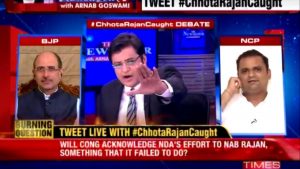Media is playing an outstanding role in today’s world. We are made to believe things which are often grossly twisted. We are affected by uncanny (facts) tales and gossips in our daily routines. Take the recent instance of film star Sridevi’s death; not everyone is obsessed with Sridevi’s life, her lifestyle and death, media made it obsessive. All the television channels and news channel were showing only her death for 24 hour those 3-4 days. They dint see any other big issue for a week. Similarly the social media blew Virat Kohli’s tweet “Australians are no longer friends” out of proportion where as he did not mean in definitely.
Media is one of the four pillars of a vibrant democracy in India. Press owns fre edom, today vast numbers of TV news channels have evolved from a single Doordarshan, which telecasted a five minute news bulletin three decades ago. The multiple media channels have increased cut-throat competition. Higher TRP guarantees sustainability of the media houses. Therefore, the focus of news is sometimes twisted to create sensation rather than credibility of a news item. Indians are emotional and journalists take advantage of their vulnerability and emotionality.
edom, today vast numbers of TV news channels have evolved from a single Doordarshan, which telecasted a five minute news bulletin three decades ago. The multiple media channels have increased cut-throat competition. Higher TRP guarantees sustainability of the media houses. Therefore, the focus of news is sometimes twisted to create sensation rather than credibility of a news item. Indians are emotional and journalists take advantage of their vulnerability and emotionality.
Internet especially the social media has re-defined Journalism. People at large depend on social media for breaking news these days. They serve as a platform to read about different perspectives. Also, the prevalence of blogging, Facebook and Twitter has given rise to citizen journalism wherein even a common man has an option to report, criticize and comment on topics. This has made the traditional media more accountable about what they broadcast. Any deception, injustice or bias shown in their reporting immediately gets mocked and shamed on the Social Media.
India has currently about 857 satellite television stations which includes variety of languages, 82237 newspapers, over a lakh of periodicals and journals, besides social media, therefore, whether you like it or not news keeps pouring in 24X7. Arnab Goswami, Vikram Chandra, Sagarika Ghose, Barkha Dutt, Rajdeep Sardesai, Ravish Kumar and few more are considered the superstars of Television news channels. And, they have imminence with the political, social and industrial bigwigs. In fact, the heroes and heroines of various fields are hands in gloves with these super journalists.
In the beginning, news channels were considered as a trustworthy source of ground reporting for giving out information to people. The inferences and judgement of the news were left to the sense of right and wrong of the viewers. However, that is not the case now. Today’s journalists and anchors usually go beyond the scope of just ‘reporting’ the news by giving their personal verdict of the matter, giving the viewers very little space to think on their own. Media plays an outstanding role in creating and shaping of public opinion and strengthening of society. So much so, that the elections are based on opinions shaped on social media. It acts as watchdog to protect public interest against malpractice and create public awareness. The television, radio, advertising, movies, the Internet, newspapers, magazines, outdoor advertising makes or breaks public opinion. There are few instances where the outbreak on media has resulted in some good.
Take a few more examples: the Sheena Bora murder case is more than a thriller movie. The twists and turns in the story, roles of media honchos Peter Mukerjee and Indrani Mukherjee, the then Police Commissioner’s personal intervention kept the public so engrossed in the case that other important issues faded for few months. Similarly, the Aarushi murder case. Every detail of the case was shown, ignoring other vital news items such as the lakhs of farmer suicides, inflation, petrol/diesel prices, Sensex, massive unemployment, ongoing scams everything.
Both print and broadcast journalism influences public opinion, determining the political agenda, providing a link between the government and the people, acting as a government watchdog, and affecting socialization. Media influence is the actual force applied by a media message, resulting in either a change or corroboration in audience or individual beliefs. The media smartly controls, enhance, or mitigates the impact on individuals and society.
In India, the most important issues are massive poverty, unemployment, malnutrition, healthcare, casteism, communalism etc., but our media usually highlights issues of relatively lesser importance, or even trivial ones, and diverts attention from the more important ones. The effect of burning issues such as latest scams gets faded by trivial issues. The bias presented by various networks is appalling; it is high time that we don’t get swayed by media opinion on issues. The intention of much of our media is to divert attention of the people from the real issues facing the masses to non-issues like lives of film stars, cricketers, and petty politics. Issues like cricket, astrology, babas, reality shows like Big Boss, Voice Kid India acts as the opium of the masses which is shown day in and day out continuously. Let’s wake up from the media slumber.














































